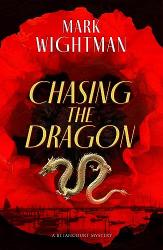The second DI Maximo Betancourt novel, set in 1940's Singapore, CHASING THE DRAGON continues his story in close follow on from the earlier novel - WAKING THE TIGER. This novel could work as a standalone, but as with anything where the focus is on a main character, it's probably best to read them in order to get the full backstory and the reasons why Betancourt finds himself in his current professional and personal situation.
The Singapore Marine Police is tasked with policing the docks and waterways in and around Singapore. Which means they are the first port of call when a local fisherman heads for the docks, after discovering the body of a man encased in fishing net floating below his fishing platform (kelong). At the same time that he arrives, the docks are busy, with the unloading of a druian crop taking centre stage, and police on scene already guarding the prized, famously stinky crop. The body, when unwrapped, reveals itself to be a white, European man, but the encasing has been so carefully and exactly applied, that the death could not possibly be accidental. Meaning Betancourt is called to investigate the murder of the man, identified eventually as American archaeologist Richard Fulbright. A man who had been on the brink of deciphering a previously untranslated / untranslatable script on a pre-colonial time relic known as the Singapore Stone. What that stone, and Fulbright's death have to do with each other is a major puzzle for Betancourt to resolve.
The setting of 1940's Singapore is wonderfully evoked in both these novels, with snippets of scene setting and social comparisons provided to give the reader a real sense of the class separations, the greed and entitlement of the white colonial powers, and the local poor, labourers, and original inhabitants. There are also glimpses into the past pre-colonial times in this novel, with the Singapore Stone providing opportunities to consider the place before the arrival of the invaders and the establishment of such an unfair society. Within this sits Betancourt himself. A policeman enforcing colonial law, he's also a mixed-race man which gives him both perspective and complications. There is also a big complication in his personal life which he struggles to come to terms with. His wife disappeared sometime ago, after a serious car accident that killed her driver. He's searched for her and cannot decide - is she dead? Was their criminal intent involved? On the one hand he needs to know what happened, he and his daughter need to know, on the other hand there's Evelyn, the most unusual police surgeon who may not wait forever.
The sense of time is also interesting - in the pre-war period when the British were convinced that Singapore would be safe, despite the rumblings within the Axis powers, the arrogance of the "ruling classes" is palpable in this novel.
There are also some elements that are perhaps more predictable - drugs, money, gangs and a lone hand against the world. Betancourt does function as a central point of focus in these novels, and there are times when he kind of disappears a little into the background, doesn't always quite hold the level of attention required to carry a storyline this complex and far-reaching. A shift forward of some of his supporting cast would probably help with that a little, and certainly the police surgeon has heaps of potential.
Needless to say a lot happens on the sidelines in this series, much of that is enthralling and very engaging. The historical aspects and that sense of time and place are a great part of the strength of both of these novels, and one of the most interesting aspects of CHASING THE DRAGON in particular.
Chasing the Dragon

Detective Inspector Betancourt of the Singapore Marine Police is first on the scene. Something doesn't quite add up. He finds out that the archaeologist, Richard Fulbright, was close to deciphering the previously-untranslatable script on a pre-colonial relic known as the Singapore Stone. This was no accidental drowning.
Is there more to this case than archaeological rivalries?
Betancourt also discovers that Fulbright had been having an affair. He is sure he is onto something bigger than just academic infighting.
A government opium factory draws criminal interest
In his investigations into the death, Betancourt finds his own life in danger, and now he has also put himself on the wrong side of British Military Intelligence, and he is unsure which set of opponents he fears the most...